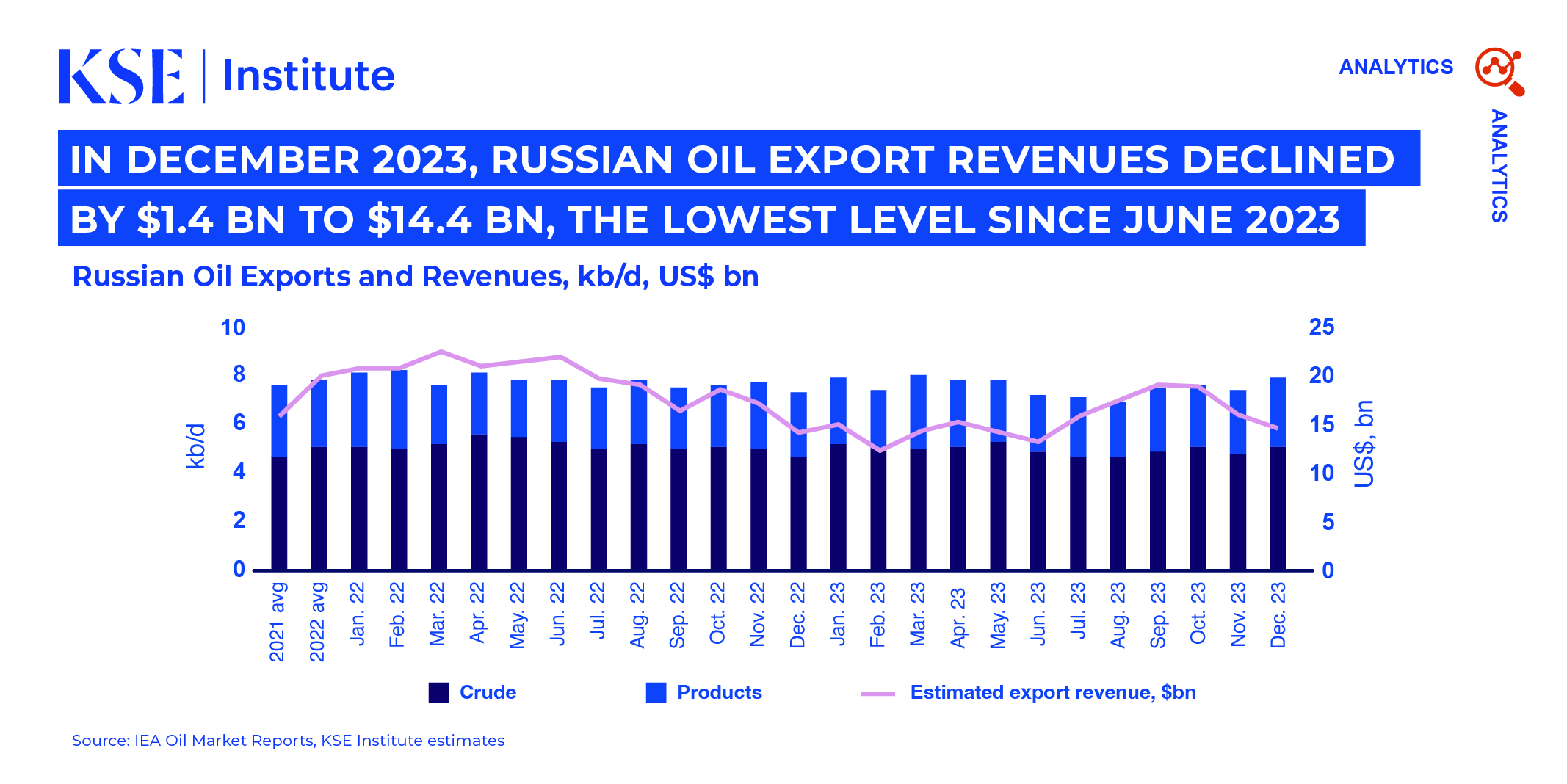Russian🛢️export revenues declined to the lowest level since June 2023
 Russian seaborne oil exports volumes increased by 6% driven by both crude and oil products exports increase (MoM) in December 2023. However, the total Russian oil export revenues declined by $1.4 bn to $14.4 bn, according to the January issue of ‘Russian Oil Tracker’ by KSE Institute. Fundamentally, this reveals that the recent G7/EU enforcement efforts improve the sanctions regime, but more action is needed.
Russian seaborne oil exports volumes increased by 6% driven by both crude and oil products exports increase (MoM) in December 2023. However, the total Russian oil export revenues declined by $1.4 bn to $14.4 bn, according to the January issue of ‘Russian Oil Tracker’ by KSE Institute. Fundamentally, this reveals that the recent G7/EU enforcement efforts improve the sanctions regime, but more action is needed.
In December 2023, Russian reliance on Western maritime services remained relatively stable compared to last month, with 25% of crude and 62% of oil products shipped with P&I Club insurance coverage. Notably, P&I Club coverage for crude oil and oil products varied by port: 73% from Arctic Ocean ports, 54% from the Black Sea, 44% from the Baltic Sea and 6% from Pacific Ocean ports had insurance.
For other shipments, Russia continues to extensively utilize the shadow fleet, posing significant environmental risks for the EU. KSE Institute estimates that in December, 196 loaded Russian shadow fleet tankers left Russian ports, with 73% of them being built more than 15 years ago. Interestingly, the top three flags of Russian shadow fleet vessels carrying crude oil are Panama, Liberia and Gabon.
UAE-based shipping companies form the core of the Russian shadow fleet. Since November 2023, five new UAE-based shipping companies with non-transparent organizational and ownership structure started carrying Russian crude without P&I insurance – Alqutb Alshamali Marine, Almuhit Alhadi Marine, Oceanlink Maritime, Symphony Marine and One Moon Marine. None of these companies carried out crude oil in 2022.
As for oil export destinations, India remains the top buyer of Russian seaborne crude. Despite a 29% decrease in overall crude imports since May, there was an 11% increase in December (MoM). On the contrary, Greece has scaled back the transportation of Russian crude and oil products, although Greek companies still remain on the lists of the ten biggest shippers.
Meanwhile, Russian crude exports to Turkey reached record levels of 421 kb/d in December 2023. Turkey also leads in Russian oil product imports, with total imports of 428 kb/d in December. Overall, Russian oil imports to Turkey was only slightly below its total oil consumption in pre-COVID 2019. Such record imports (almost 0.9 mb/d) help Russian oil reach destinations that are either explicitly or implicitly closed due to sanctions.
This strong demand for Russian oil exports is fueled by significant price discounts. Average Urals FOB Baltic and Black Sea prices dropped by $7/bbl and $9/bbl respectively to ~$60/bbl, while ESPO FOB decreased by $6/bbl to $72/bbl. However, the discount on FOB Baltic and Black Sea has widened by additional $2/bbl and $4/bbl respectively amid signs of more rigorous price cap policy enforcement in December.
KSE Institute now projects Russian oil revenues at $183 billion in 2023, up from the previous estimate of $153 billion in July. Under the base case with current oil price caps and stronger sanctions enforcement, revenues are expected to contract to $145 billion and $139 billion in 2024 and 2025. Lowering the price cap to $50/bbl discount to forecast Brent prices would result in revenues falling to $69 billion and $59 billion in 2024 and 2025. However, weak sanctions enforcement could lead to an increase in Russian oil revenues, reaching $189 billion and $183 billion in 2024 and 2025 respectively.
We provide three critical measures that can quickly and effectively address Russian efforts to evade sanctions on its oil exports. Firstly, G7/EU authorities must ensure coalition service providers have robust proof of oil prices and can effectively implement the price cap. Secondly, EU coastal states should use “choke points” to limit Russia’s “shadow fleet.” Thirdly, price cap coalition countries should increase penalties for G7/EU companies and third-country entities that violate price caps.
Full Russian Oil Tracker for January 2024 by KSE Institute is available here.
Contacts


